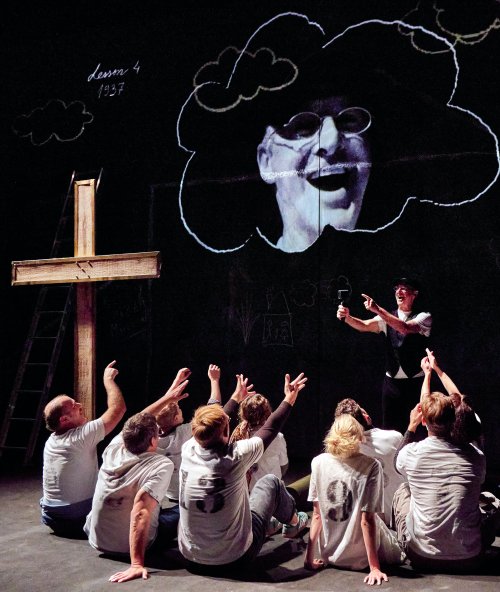
By: Darryl Reilly
“A Jew and a Pole can sit down together and have a beer and dance, and no one cares!” So, prophetically declares a character in playwright Tadeusz Slobodzianek’s staggering historical epic, Our Class. For an absorbing three hours including an intermission, we follow the lives of five Jewish and five Catholic Poles who are grade school friends beginning in 1925, they come of age during W.W. II; first their town is occupied by the Russians and then the Germans. Polish antisemitism is searingly depicted through stylized often violent and unsettling sequences as we learn who lives into old age and who dies during youth, by the time this highly theatrical chronicle elegiacally concludes in 2003.
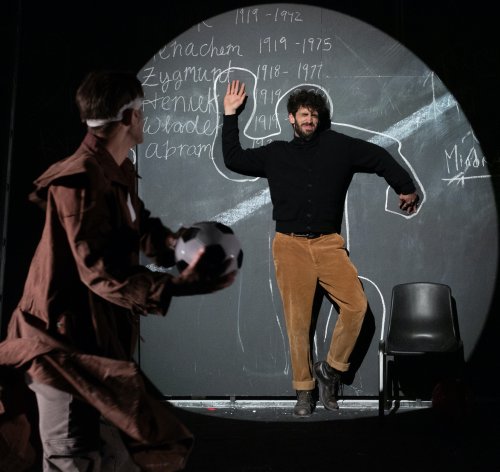
(Photo credit: Jeremy Daniel)
Mr. Slobodzianek is an eminent Polish playwright and theater figure. Our Class premiered at London’s Royal National Theatre in 2009; its New York City debut was earlier this year at the Brooklyn Academy of Arts’ Fishman Space, this production is now being presented Off-Broadway at the Classic Stage Company. Slobodzianek demonstrates a supreme command of dramatic writing with this grandiose work, charting the transformation of comrades into enemies due to world forces beyond their control. It is structured as a series of sharp scenes numerically entitled in succession “Lessons…” with the succeeding years stated. Each character is richly delineated; we really get to know of all of them and become concerned for their welfare due to their chronic direct audience address and occasional interactions . Norman Allen’s scintillating English translation resonates with emotion and surges with momentum, as these characters collude with painful truths.
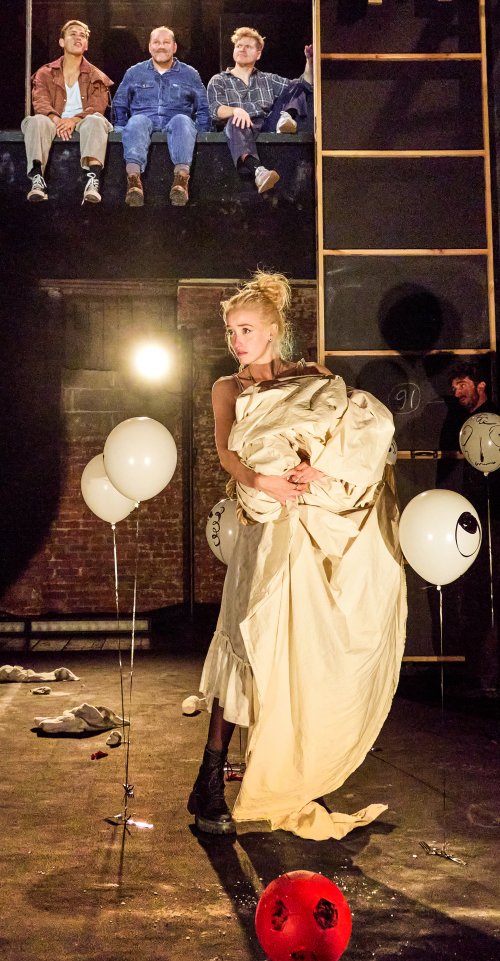
Gales of wafting smoke, an actor’s histrionics, dramatic lighting and white balloons with stick figure-style faces representing people, are elements used to visualize over 1000 Jewish women and children burning to death in a barn locked by Polish townspeople. This is just one highlight of director Igor Golyak’s tremendous physical staging which exhibits force, focus and spectacle, on the three-sided playing area. A chilling, suggestively staged gang rape of a Jewish woman on a ladder, a young Jewish man being beaten to death and brutal prisoner interrogations, are among other jolting portions. These alternate with gorgeous tableaus, stunning stage pictures and delightful singing and dancing numbers, masterminded by choreographer Or Schraiber. The recurring framing device is that we’re watching actors holding scripts performing this show. Mr. Golyak smoothly integrates this conceit into his production and gloriously takes us into Peter Brook territory. Golyak is the producing artistic director of the Boston area-based Arlekin Players Theatre which originally presented this production. Later this season at the Classic Stage Company, he will direct The Merchant of Venice with this dynamic company.
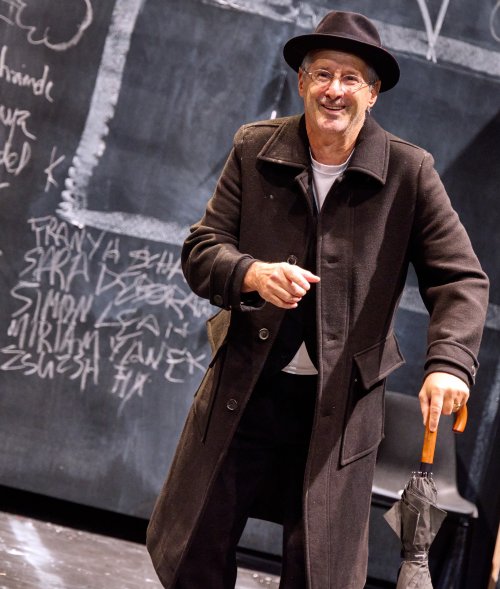
The lanky and gregarious Richard Topol shines as a pivotal figure who leaves the town at the age of 19, for the United States and becomes a New York City rabbi. His periodic correspondence is cleverly represented by live streaming from throughout the theater. Gus Birney is ethereal as a Jewish woman on her own struggling to survive with her baby. The earthy Ilia Volok and the feisty Alexandra Silber are outstanding as an interfaith couple defying the odds. Formidable Tess Goldwyn is a haunting Righteous Among the Nations Pole. Charismatic Andrey Burkovskiy offers a fiery portrait of a Polish Jew whose survival takes a tragic toll. The dashing José Espinosa commandingly turns from a happy go lucky young man into a heartless following orders Polish officer. Will Manning’s performance as a collaborationist Polish priest is admirable. Soulful Stephen Ochsner is poignant as a Jewish man painfully caught up in the horrors. Elan Zafir uses his everyman persona to great effect for his portrayal of a wily Polish opportunist who lives with his family in a house stolen from Jews.
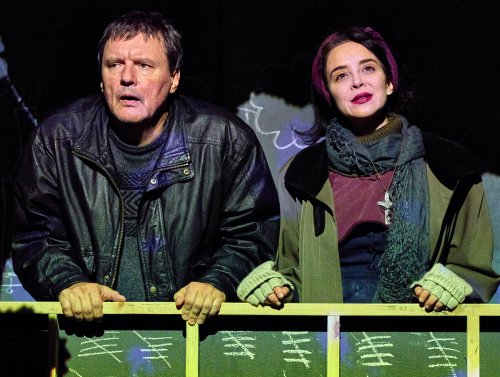
Jan Pappelbaum’s bracing abstract scenic design inventively and swiftly connotes numerous locales and the passage of time. It includes the focal point of the stage’s back wall as a schoolroom blackboard on which are shown in chalk the years of the actions, names of slaughtered residents, other facts, and symbolic imagery. These are rendered by Eric Dunlap and Golyak’s artfully stark projection and video design. Lighting designer Adam Silverman provides an arresting array of moody hues which perfectly complement the piece’s tones and incidents, eerie darkness abounds; it is recreated here by Seth Reiser. Ben Williams’ virtuoso sound design realizes the wartime effects and composer Anna Drubich’s eclectic original music. Costume designer Sasha Ageeva’s pseudo-contemporary rustic and everyday wear emphasizes a timeless dimension.
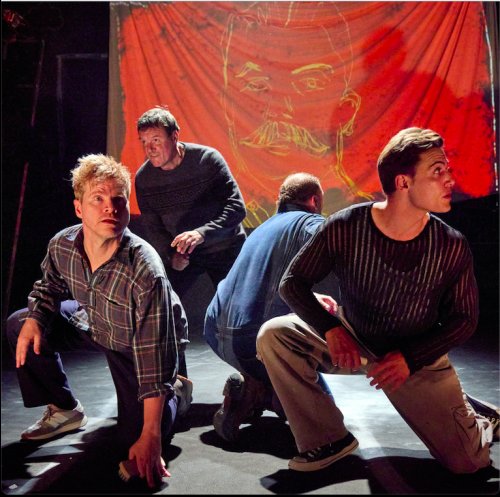
(Photo credit: Jeremy Daniel)
Our Class is a galvanizing and heartbreaking Holocaust dramatization.
Note: At the performance under review, shortly before the end of the first act, the fire alarm went off. The performance ceased and the audience was evacuated. 15 minutes later the audience was readmitted and the performance resumed from just before the interruption. This incident had no impact on the opinions expressed in this review.
Our Class (through November 3, 2024)
Arlekin Players Theatre
Classic Stage Company’s Lynn F. Angelson Theater,
136 East 13th Street, in Manhattan
For tickets, visit www.ourclassplay.com
Running time: three hours including one intermission
